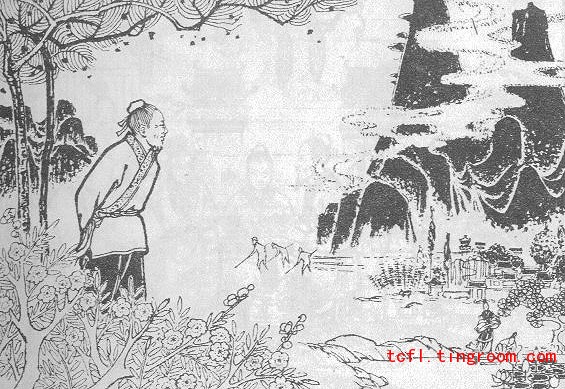| 世外桃源 | ||||||||||||
| 东晋年间,武陵有一个老渔夫。一天,他驾着渔船出去打鱼。船儿沿着溪水行驶,老渔夫不知怎么迷了路。忽然,一片美丽的桃花林出现在他眼前。渔夫觉得很奇怪,继续往前寻找桃花林的尽头。树林的尽头是一座山,山脚下有个小洞。渔夫穿过了山洞,竟然看到了另外一个世界。那里的人们过着幸福安宁的生活,大家和睦相处,没有纷争,老人们安静地休息,儿童愉快地玩耍,没有外界那样动荡不安。大家见了老渔夫,嘱咐他不要把在那儿看到的一切告诉别人。 渔夫回到了家,把这件事告诉了村庄里的人。大家都不相信,于是跟着他去看看到底有没有这个地方。可是,这次去他们再也找不到桃花林尽头的这个世界了。 这个成语用来形容一个与世隔绝、生活安乐的理想国家。 |
||||||||||||
|
||||||||||||
| Utopia | ||||||||||||
 During Dong Jin Dynasty, there was an old fisherman in Wu Ling district. One day, he went fishing on a fishing boat. The boat was floating along a stream. The fisherman, unconsciously, lost his way. Suddenly, a beautiful forest of peach trees, with flowers in full bloom, caught his eyes. Curiously, he went on boating to look for the end of the forest. At the end of it stood a mountain with a small cave on the foot. After the fisherman walked through the cave, a whole new world actually displayed in front of him. During Dong Jin Dynasty, there was an old fisherman in Wu Ling district. One day, he went fishing on a fishing boat. The boat was floating along a stream. The fisherman, unconsciously, lost his way. Suddenly, a beautiful forest of peach trees, with flowers in full bloom, caught his eyes. Curiously, he went on boating to look for the end of the forest. At the end of it stood a mountain with a small cave on the foot. After the fisherman walked through the cave, a whole new world actually displayed in front of him.People there were leading a peaceful and happy life: they got along with each other harmoniously and did not argue,dispute. The old were having rest quietly and the young playing. It was not like the outer world, it was a world free of turbulence. On seeing the fisherman, people asked him not to tell what he saw there to others. However, the fisherman told the villagers his experience after returning home. They did not believe him at all and they followed him to see whether it was true. But they cannot find the place anymore. The idiom is used to describe a secluded and peaceful utopia. |
||||||||||||
 English
English Japanese
Japanese Korean
Korean French
French German
German Spanish
Spanish Italian
Italian Arab
Arab Portuguese
Portuguese Vietnamese
Vietnamese Russian
Russian Finnish
Finnish Thai
Thai dk
dk